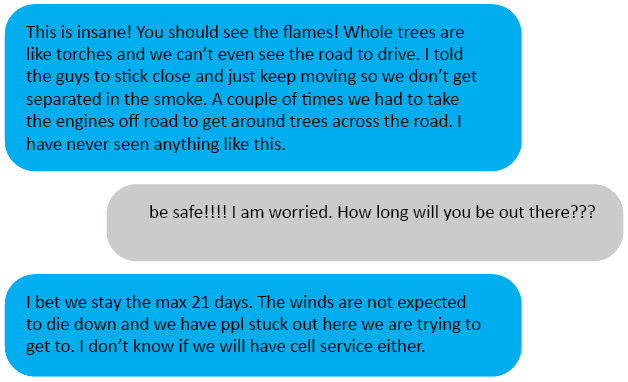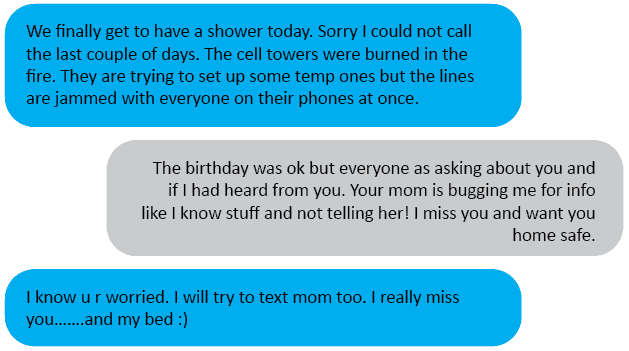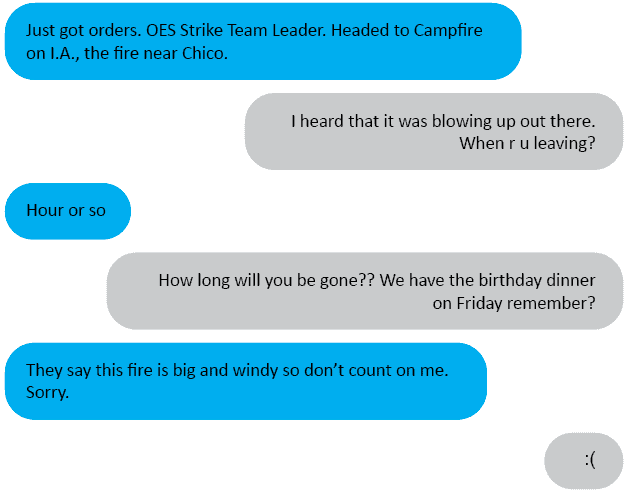The Camp Fire in Northern California’s Butte County started Nov. 8, 2018, in the area east of Chico, California. The cause was later determined to be a faulty electrical transmission line and transformer that sparked the most destructive wildfire in California history. It claimed 86 lives, displaced tens of thousands, and caused over $11 billion in property damage. At the center of the destruction was the small town of Paradise. Paradise turned out to be anything but, as the one road in and out of town quickly became clogged with burned vehicles and people.
My husband was working his normal shift as a battalion chief with a local municipal fire department located 85 miles from Chico, CA. He was a month away from retirement following a 38-year career in the fire service when he was sent to lead five responding engines and their crew for the initial attack, or I.A., at the center of the flames. That meant he was in command of 20 firefighters and leading a trainee strike team straight into what would be the worst firefight of his life. As the wife of a firefighter, my job was to support … and wait. And of course, I worried.
Public safety jobs are inherently dangerous. We all know this from the moment we sign up. In fact, many are drawn to firefighting by the feeling of being truly being alive that only comes after facing mortal danger. But what about the families of the men and women who protect and serve? We tend to be less enthusiastic about the “fear factor” aspect of a public safety career. Instead, we’re often overwhelmed as we are left at home to tend to children, financial obligations and other commitments — all while staying brave and fighting the anxiety of knowing our loved ones are potentially in harm’s way.
For first responders facing extended emergencies, effective family communication can be the key to maintaining peace of mind.

I can attest the fear is real and palpable when you hear these stories. The public safety spouse walks a fine line trying to keep family and loved ones informed without scaring them into sleepless nights and crippling anxiety. Should the police officer, firefighter, or EMT not say anything at all about their day? Or is it best to give detailed accounts to better help the family understand what their loved one is going through?
Effective family communication can be the key to maintaining peace of mind.
The answer, I believe, is a little of both. But the level of communication is best decided before the first responder leaves, and should be tailored to the needs and personalities of everyone in the family. Just as each person has a different way of handling stress, each of your loved ones has a different way of dealing with the anxiety of public safety emergencies. Although the family isn’t on scene during the crisis, their minds will fill in the blanks about the level of danger and severity of impact the event will have on you and your crew if they are not given any information.
One of the best resources for family communication during such a prolonged emergency is to have an established departmental information portal. This secure resource can serve as a place to go for timely information about deployments/emergencies. If your department does not have one, check with the administration about who would be the appropriate point of contact in the future. Many departments also have family groups on social media for support. By joining these, you and your family members can feel less isolated and find solace during a callout.
Talk to your spouse and family. What is their level of information overload? Would they like some details or just to know you are safe each day, if possible? How much will the children be told? All this is important to help ease the anxiety your loved ones feel while you are away. It is helpful to remember that, in addition to increased responsibilities for home and family activities during your absence, they’ll also be fielding questions and concerned calls from friends and extended family.

Your family is at the mercy of your health and well-being. Listening to their feelings and keeping them up to date with your state of mental health will help to relieve the pressure of the public safety profession. You cannot escape the risks of these exciting and dangerous careers, but you can help ease some of the discomfort your most important supporters feel just by making family communication a priority. By planning for the emergency, establishing a lifeline of communication, leaning on support systems, and talking about the event after the fact, you can help to keep your home life a happy one.
